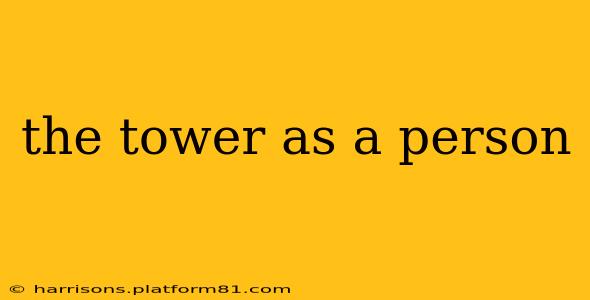The Tower as a Person: Exploring the Archetype of the Imposing Structure
The tower, as a physical structure, evokes a range of emotions and associations. But what if we considered the tower as a person? This anthropomorphism allows us to explore deeper symbolic meanings and delve into the psychological and archetypal significance of this imposing architectural form. This isn't about literal transformation, but about understanding the human qualities and characteristics we project onto towers.
What personality traits would a tower possess?
A tower, personified, might possess a multitude of traits depending on its context and design. Consider a slender, elegant spire: this "tower-person" might be perceived as graceful, aloof, perhaps even a bit fragile, yet reaching for the heavens with ambition. In contrast, a thick, imposing fortress tower might embody strength, stoicism, and an unwavering sense of protection. Its personality would likely be austere and guarded. The material itself influences our perception; a stone tower suggests enduring strength and history, while a glass tower speaks of modernity, transparency, and ambition.
What are the strengths and weaknesses of a tower-person?
Strengths: The tower-person's strengths often mirror the physical characteristics of the tower itself. These might include:
- Resilience: Able to withstand the test of time and harsh conditions.
- Endurance: Standing firm against the elements and the passage of years.
- Stability: A reliable presence, a constant in a changing world.
- Heightened Perspective: Possessing a unique and broad viewpoint due to its elevated position.
- Strength & Power: A symbol of authority and control, often commanding respect and even fear.
Weaknesses:
- Isolation: A tower, especially a solitary one, can represent feelings of isolation and detachment.
- Inflexibility: Unable to readily adapt to change or shift perspectives.
- Impenetrability: Can appear cold, unapproachable, and even intimidating.
- Vulnerability (to certain elements): Despite its strength, a tower can be vulnerable to specific threats (earthquakes, lightning, etc.).
- Arrogance: The towering height can sometimes symbolize arrogance or a sense of superiority.
How does the tower's location affect its "personality"?
The context of the tower significantly affects its perceived personality. A lonely tower on a desolate moor evokes a different feeling than a bustling tower within a city skyline.
- A city tower: Might be described as ambitious, competitive, even slightly cynical, reflecting the urban environment's dynamism and struggles.
- A rural tower: Could represent quiet strength, patience, and a connection to nature.
- A castle tower: Might embody a history of defense, perhaps with a touch of paranoia or a strong sense of responsibility.
Is a tower a hero or a villain?
Whether the "tower-person" is a hero or villain depends entirely on the narrative and its role within the story. A lighthouse tower, guiding ships to safety, is clearly heroic. A dark, abandoned tower overlooking a haunted landscape might be perceived as menacing. The context and the story surrounding the tower dictate its morality.
What lessons can we learn from the tower as a person?
Personifying the tower allows us to gain a richer understanding of our own human qualities. It prompts introspection about our own strengths and vulnerabilities, our resilience in the face of adversity, and our tendency toward isolation or connection. The tower’s enduring presence invites reflection on our own legacies and the marks we leave on the world.
By considering the tower as a person, we move beyond a purely structural analysis and uncover a deeper symbolic resonance, enriching our understanding of this timeless architectural form and its enduring power.
